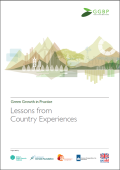This report summarizes the main findings of a national green jobs assessment conducted in Mexico in 2013. The assessment revealed how many green jobs currently exist in the country and which sectors show the strongest potential for further green jobs creation.
This report seeks to provide practitioners with the tools and information needed to respond to the public expenditure policy and management challenges arising from climate change. It is a series of notes and supporting materials written as a first step towards consolidating current research and international experience, identifying emerging practice and providing practical and applicable guidance for staff of central finance agencies, development agencies, environmental agencies and other international organizations working on climate change issues. In addition to emphasizing the importance of strengthening national systems throughout, the Sourcebook focuses on the specific public expenditure policy and management challenges posed by climate change, such as decision-making in the face of uncertain future climate conditions, expenditure planning for extreme weather and climate events, the lack of agreed budget definition and classification of climate change activities.

Green growth is becoming an attractive opportunity for countries around the world to achieve poverty reduction, environmental protection, resource efficiency and economic growth in an integrated way. Green growth strategies generate policies and programs that deliver these goals simultaneously. They accelerate investment in resource efficient technologies and new industries, while managing costs and risks to domestic taxpayers, businesses, communities and consumers.
This report carried out by the Green Growth Best Practice (GGBP) initiative, is the first comprehensive international assessment of lessons from experiences of pursuing green growth across all levels of government and all regions. The report is the result of a collaborative partnership between the Climate & Development Knowledge Network (CDKN), the European Climate Foundation (ECF) and the Global Green Growth Institute (GGGI). It engaged 75 authors in evaluating more than 60 programs around the world.

This report describes efforts by the ClimateWorks Foundation and the World Bank to quantify the multiple economic, social, and environmental benefits associated with policies and projects to reduce emissions in select sectors and regions.
The report has three objectives: 1) to develop a holistic, adaptable framework to capture and measure the multiple benefits of reducing emissions of several pollutants; 2) to demonstrate how local and national policymakers, members of the international development community, and others can use this framework to design and analyze policies and projects; and 3) to contribute a compelling rationale for effectively combining climate action with sustainable development and green growth worldwide.
Developing countries are faced with the dual challenge of reducing poverty while improving management of natural capital and mitigating the emission of greenhouse gases (GHG) and local pollutants. The challenge is particularly acute for large, rapidly growing economies, such as India, China and Brazil. In 2007 the Energy Sector Management Program (ESMAP) and the World Bank began to provide support to countries to develop long-term frameworks for reducing GHG emissions in a way that is compatible with economic growth objectives. This report presents lessons learned from seven country studies. These include: countries must take the leading role; adopt a flexible approach and build a multi-disciplinary team; stakeholder engagement and consensus building is essential; allow sufficient time and resources; and invest in data and tools. The report is intended as a practical guide for government officials, practitioners and development agencies involved in low carbon development planning.
This summary was prepared by Eldis.
